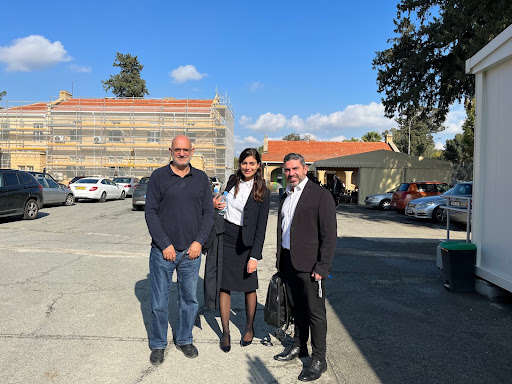The accusation came after four policemen threatened to sue Makarios Drousiotis and requested his book be withdrawn and chapters mentioning them removed before it can be distributed again.
“The entire book, in particular the chapters “Deposition to the police” and “Rigged probe,” do not reflect the facts,” the lawyers of the four policemen said in a letter.
“Our clients are presented as immoral, part of a mafia state, a description that is absolutely false, unfounded and offensive,” the letter claimed. “The professional and personal reputation of our clients is harmed,” and thus Drousiotis should also have to pay compensation, they argued.
Since he started publishing his trilogy about the allegedly widespread graft among the Mediterranean island’s political and financial elite, Drousiotis said he was exposed to obstructions, including death threats and the hacking of his electronic devices.
According to the author, the difficulties started more than a year before the 2020 publication of “The Gang,” the trilogy’s first book which exposed how during the island’s 2013 banking crisis, the political elite rejected a European bailout package in order to protect the interests of the Kremlin.
Cypriot media had also ignored his findings from this and the 2021 book “Crime in Crans Montana,” which describes how president Nicos Anastasiades allegedly walked out of the 2017 talks about the reunification of the country.
Cyprus, which gained its independence from Britain in 1960, is divided between its Greek and Turkish communities after Turkey invaded the island in 1974 in response to a Greek-inspired coup.
However, the publication of the third book titled “The Mafia State” in October caused a political earthquake, as he alleged that Cyprus’ President Nicos Anastasiades, who compelled his ministers to sign a code of conduct that prevents them from accepting personal invitations or hospitality from foreign governments, legal entities and individuals whose activity is related to the official’s portfolio, had himself accepted donations from wealthy businessmen.
Drousiotis served as Anastasiades’ advisor from March 2013 to October 2014. Anastasiades threatened with a lawsuit.
“In my 40 years career in politics, I never filed a libel lawsuit,” the President whose second and last term ends next month, said in an interview in November. “I never did so to avoid being accused of attempting to gag the press. But I am reconsidering my stance because it’s impossible for me to tolerate this smear”.
Anastasiades didn’t sue so far, but four police officers working at the cybercrime department are also threatening to do so.
Their request for the withdrawal of the latest book came in the form of a letter to the author at the beginning of this month, days after a court dismissed a similar request filed by an IT expert whom Drousiotis hired to install protective software on his computer.
Instead, the writer claims, the expert installed spyware on behalf of the government intelligence service.
Drousiotis had reported the hacking to the police.
After waiting for two and a half years for authorities to look into the hack, “police investigations produced zero results despite all evidence that I gave them,” Drousiotis said in a written statement on Wednesday.
Among other, his claim is also based on a forensic analysis carried out by the Netherlands-based Proximities Risk Consultancy. “I have proved in my book that the police failed to properly investigate both the wiretapping of my communications and my physical surveillance aimed at intimidating me and preventing me from publishing the book.”
The four policemen are unlikely to have taken this step without coordinating it with their bosses, Drousiotis said. “Instead of investigating cases, they threaten the victim of a crime with legal action”.
According to political analyst Andromachi Sophocleous, the incident may further hurt public trust in police, which already suffers from the government’s reluctance to take action against corruption.
An anti-corruption authority that the government appointed last year “is a toothless body,” Sophocleous continued.
“Every criminal prosecution (they may recommend) still has to be approved by the attorney-general who was a member of the government”, she said in reference to the former minister of justice George Savvides, whom Anastasiades appointed in 2020.
“It is safe to say that just like with other institutions in Cyprus, the society has a significant trust deficit towards the police,” Sophocleous continued. “We had cases of police brutality, revelations about failures to investigate a serial killer of women. How is police work not part of the public discourse?”.
As a result, trust in key institutions in the country has eroded over the past ten years, she concluded.

